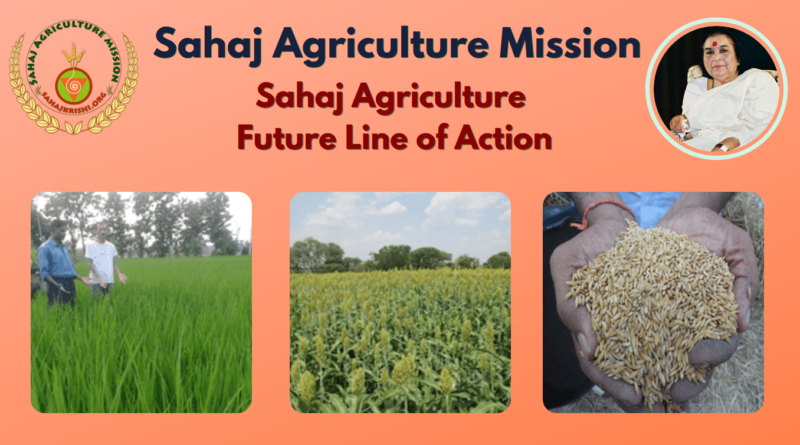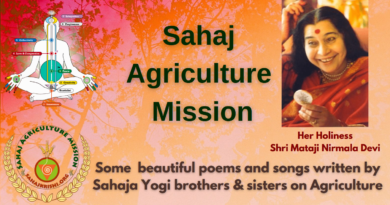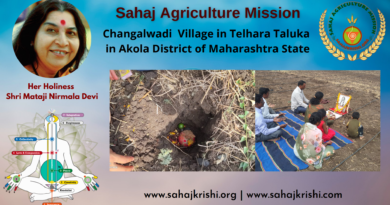Sahaj Agriculture – Future Line of Action
Recommendations
The experiences of farmers and the initial observations at different research centres, we feel an encouraging trend of boosting production of various crops and hence we suggest the following points for future line of action:
- Based on the scientific findings and experiences of farmers, it is recommended that Sahaja Agriculture is highly successful and zero budget farming system.
- There is a need to Agricultural Universities and ICAR institutes for conducting the Sahaj Agricultural experiments for the validation. KVKs can demonstrate this to the farmers. Experiments on the present 10 NRCs should continue.
- One scientist at each of NRCs and Agriculture Universities be entrusted with the responsibility of closely observing these experiments.
- Agricultural Universities and ICAR institutes must also carry out studies on other crops.
- Further research by R&D institutions should cover the studies on the impact of Sahaj Agriculture techniques on the control of diseases and pests, quality of produce and physiology and Genetics etc. of the crops.
- To give vibrations to tools, machines, tractor, FYM etc. at the time of using them in agriculture
- The techniques of Sahaja Agriculture should also be studied and practiced in the other allied areas like vermicompost, Horticulture, Forestry, medicinal plants, animal husbandry, poultry, fisheries and bee keeping etc.
- To study the effect of giving vibrations on materials like tools, machines, tractor, FYM etc. at the time of using them in agriculture.
- Sahaj Agriculture must be expanded to other states like J&K, Ladakh, Punjab, Bengal and north-eastern states.
- There should be special efforts for promotion of Sahaj Agriculture on the lands of marginal farmers and “Suicidal Zones” (particularly from Vidarbha and Marathwada area of Maharashtra State) for encouraging Sahaj Krishi to provide respite to the ongoing problems of mass suicides.
- The scientific results and experiences of farmers on beneficial effects of Sahaja Agriculture should be shared with global Sahaja Yoga community through country Head in respective countries.
- Constitution of Sahaja Agriculture Committees at State, District and Block levels in each state.
- Launching of nationwide “Sahaja Agriculture Awareness Rath Yatra” in the country learning from the experience of “Sahajayoga Rath Yatra”.
- Preparation and distribution of Sahaja Agriculture literature, booklet, posters and pamphlets in simple local languages and Launching of Sahaja Agriculture programmes at state, district, block and village Panchayat levels.
- Distribution of Sahaja Agriculture literature and booklet etc. to policy makers, officials of Ministry of Agriculture and ICAR, officials and scientists of Agricultural, Horticulture and Forestry universities and their research Stations and Krishi Vigyan Kendra, officials of State departments of Agriculture, Horticulture and Forest, NGOs.
- Distribution of pamphlets and information on Sahaja Agriculture to above agencies through email and whatsapps groups etc.
- To organize the workshop/seminars on Sahaja Agriculture at state and district levels before start of the kharif and rabi seasons (Pre seasonal Sahaja Agriculture seminars/Workshops).
- To identify the serious agricultural issues in each state and prepare the Work plan to carry out research to address those issues.
- To organize Farmers Field Days on Sahaja Agriculture to address the issues of the farmers.
- To communicate the results of research already done by ICAR with a request to state Agricultural universities/ICAR institutes to start local experiments and extension activities under the guidance of Sahaja Agriculture Experts.
- Agricultural universities/ICAR institutes to organize the Sahaja Agriculture programmes/exhibitions during their Agricultural workshops/melas for the farmers.
- To organize the Sahaja Agriculture programmes/exhibitions at district and block levels in collaboration with Agriculture/Horticultural officials.
- Making a documentary film on Sahaja Agriculture after collecting all inputs on research and training and experiences of farmers.
- To get the Sahaja Agriculture included in the syllabus of schools, colleges and universities.
- To start the Toll free service on Sahaja Agriculture.
- To establish Printing press on Sahaja Agriculture at National level.




